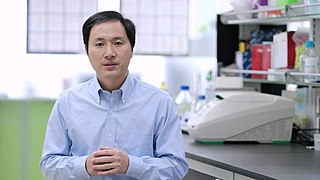The Crispr Baby Scientist Is Back. Here’s What He’s Doing Next
By Emily Mullin,
Wired
| 12. 21. 2022
In November 2018, Chinese scientist He Jiankui shocked the world when he announced, first on YouTube and then at an international scientific gathering in Hong Kong, that he had used Crispr to alter the genetic makeup of human embryos, which were used to establish pregnancies and resulted in the birth of the world’s first gene-edited babies.
Backlash against He was harsh and swift. Members of the scientific community condemned his experiments as unethical and voiced concerns over the babies’ health, about which little is known today. The Chinese government suspended his research, saying he violated medical regulations. In December 2019, a Chinese court found He guilty of illegal medical practices and sentenced him to three years' imprisonment. In light of He’s experiment, China has since adopted regulations prohibiting the modification of human embryos for reproductive purposes. He was released from prison in April.
In recent months, He has taken to Twitter and the Chinese social media platform Weibo to publicize his next steps. Previously a researcher at Southern University of Science and Technology in Shenzhen, He says...
Related Articles
By Anna Louie Sussman, The New York Times | 04.01.2025
When Noor Siddiqui was growing up, her mother developed retinitis pigmentosa, a condition that leads to gradual vision loss. When Ms. Siddiqui’s mother was in her 30s, she began going blind. Last summer, Ms. Siddiqui told a podcast host that...
By Amanda Hess, The New York Times | 04.05.2025
Image "Elon Musk" by Debbie Rowe on Wikimedia Commons licensed under CC by S.A. 3.0
For months, an internet-wide guessing game has swirled around the question of where Elon Musk’s intelligence falls on the bell curve. President Trump has called...
By Peter Wehling, Tino Plümecke, and Isabelle Bartram
| 03.26.2025
This article was originally published as “Soziogenomik und polygene Scores” in issue 272 (February 2025) of the German-language journal Gen-ethischer Informationsdienst (GID); translated by the authors.
In mid-November 2024, the British organization Hope not Hate published its investigative research ‘Inside the Eugenics Revival’. In addition to documentating an active international “race research” network, the investigation also brought to light the existence of a US start-up that offers eugenic embryo selection. Heliospect Genomics aims to enable wealthy couples to...
By Dalton Conley, The New York Times | 03.13.2025
Since Francis Galton coined the phrase “nature versus nurture” 150 years ago, the debate about what makes us who we are has dominated the human sciences.
Do genes determine our destiny, as the hereditarians would say? Or do we enter...




